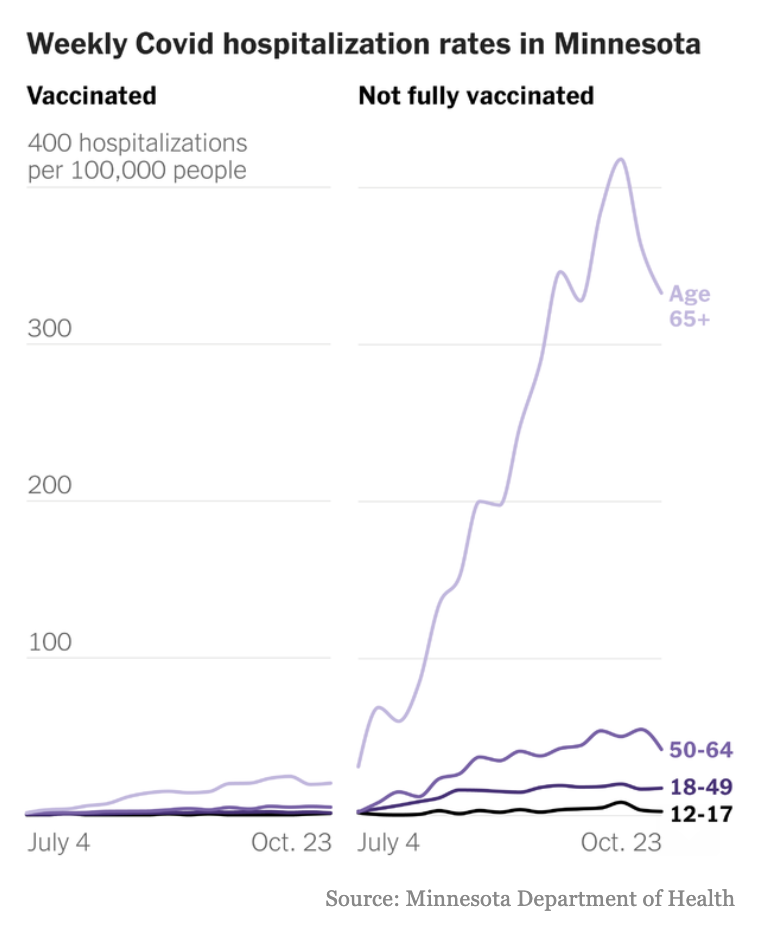Making sense of the latest COVID surge

A free daily email with the biggest news stories of the day – and the best features from TheWeek.com
You are now subscribed
Your newsletter sign-up was successful
Yet another COVID-19 surge has arrived. Instead of a stretch of predicted decline, cases have risen about 30 percent this month, The New York Times' David Leonhardt reports. And while it's essentially futile to try and predict what's behind these frustrating numbers (a full explanation remains unclear), what's better is to focus on how to think about them, Leondhart says.
Very important to remember is that, for most people, the vaccines are still "remarkably effective" at neutering COVID's disastrous effects, but the "main dividing line" in that sample is age, Leonhardt writies.
For example, in Minnesota the death rate for fully vaccinated people under 50 during the Delta surge was so low that the rate automatically rounded to zero. Washington State saw something similar — in its most recent report, the death rate for fully vaccinated residents under 65 was "too low to be meaningful."
The Week
Escape your echo chamber. Get the facts behind the news, plus analysis from multiple perspectives.

Sign up for The Week's Free Newsletters
From our morning news briefing to a weekly Good News Newsletter, get the best of The Week delivered directly to your inbox.
From our morning news briefing to a weekly Good News Newsletter, get the best of The Week delivered directly to your inbox.

The same goes for hospitalization rates for vaccinated individuals under 65. In fact, when compared with other common reasons for visiting an emergency room, like vehicle or bicycle crashes, COVID for that group "may present less risk than a car trip to visit relatives this week," says Leonhardt.
Where things get dicier is, of course, with older Americans, particularly those in their 80s and 90s; even after vaccination, COVID "presents a real risk" for them, Leonhardt explains. Consequently, that group will need protected during a surge, meaning their vaccination and also the vaccination of those who might infect them remains key.
With Thanksgiving approaching and cases rising, Leonhardt recommends three pieces of advice to mitigate risk for older relatives. First, insist everyone attending your feast be fully vaccinated if eligible. Two, encourage testing before arrival. And three, when the time comes, "try to put aside your COVID anxiety and enjoy the holiday."
A free daily email with the biggest news stories of the day – and the best features from TheWeek.com
Brigid Kennedy worked at The Week from 2021 to 2023 as a staff writer, junior editor and then story editor, with an interest in U.S. politics, the economy and the music industry.
-
 Political cartoons for February 7
Political cartoons for February 7Cartoons Saturday’s political cartoons include an earthquake warning, Washington Post Mortem, and more
-
 5 cinematic cartoons about Bezos betting big on 'Melania'
5 cinematic cartoons about Bezos betting big on 'Melania'Cartoons Artists take on a girlboss, a fetching newspaper, and more
-
 The fall of the generals: China’s military purge
The fall of the generals: China’s military purgeIn the Spotlight Xi Jinping’s extraordinary removal of senior general proves that no-one is safe from anti-corruption drive that has investigated millions
-
 A Nipah virus outbreak in India has brought back Covid-era surveillance
A Nipah virus outbreak in India has brought back Covid-era surveillanceUnder the radar The disease can spread through animals and humans
-
 Trump HHS slashes advised child vaccinations
Trump HHS slashes advised child vaccinationsSpeed Read In a widely condemned move, the CDC will now recommend that children get vaccinated against 11 communicable diseases, not 17
-
 Covid-19 mRNA vaccines could help fight cancer
Covid-19 mRNA vaccines could help fight cancerUnder the radar They boost the immune system
-
 FDA OKs generic abortion pill, riling the right
FDA OKs generic abortion pill, riling the rightSpeed Read The drug in question is a generic version of mifepristone, used to carry out two-thirds of US abortions
-
 The new Stratus Covid strain – and why it’s on the rise
The new Stratus Covid strain – and why it’s on the riseThe Explainer ‘No evidence’ new variant is more dangerous or that vaccines won’t work against it, say UK health experts
-
 RFK Jr. vaccine panel advises restricting MMRV shot
RFK Jr. vaccine panel advises restricting MMRV shotSpeed Read The committee voted to restrict access to a childhood vaccine against chickenpox
-
 Texas declares end to measles outbreak
Texas declares end to measles outbreakSpeed Read The vaccine-preventable disease is still spreading in neighboring states, Mexico and Canada
-
 RFK Jr. shuts down mRNA vaccine funding at agency
RFK Jr. shuts down mRNA vaccine funding at agencySpeed Read The decision canceled or modified 22 projects, primarily for work on vaccines and therapeutics for respiratory viruses
